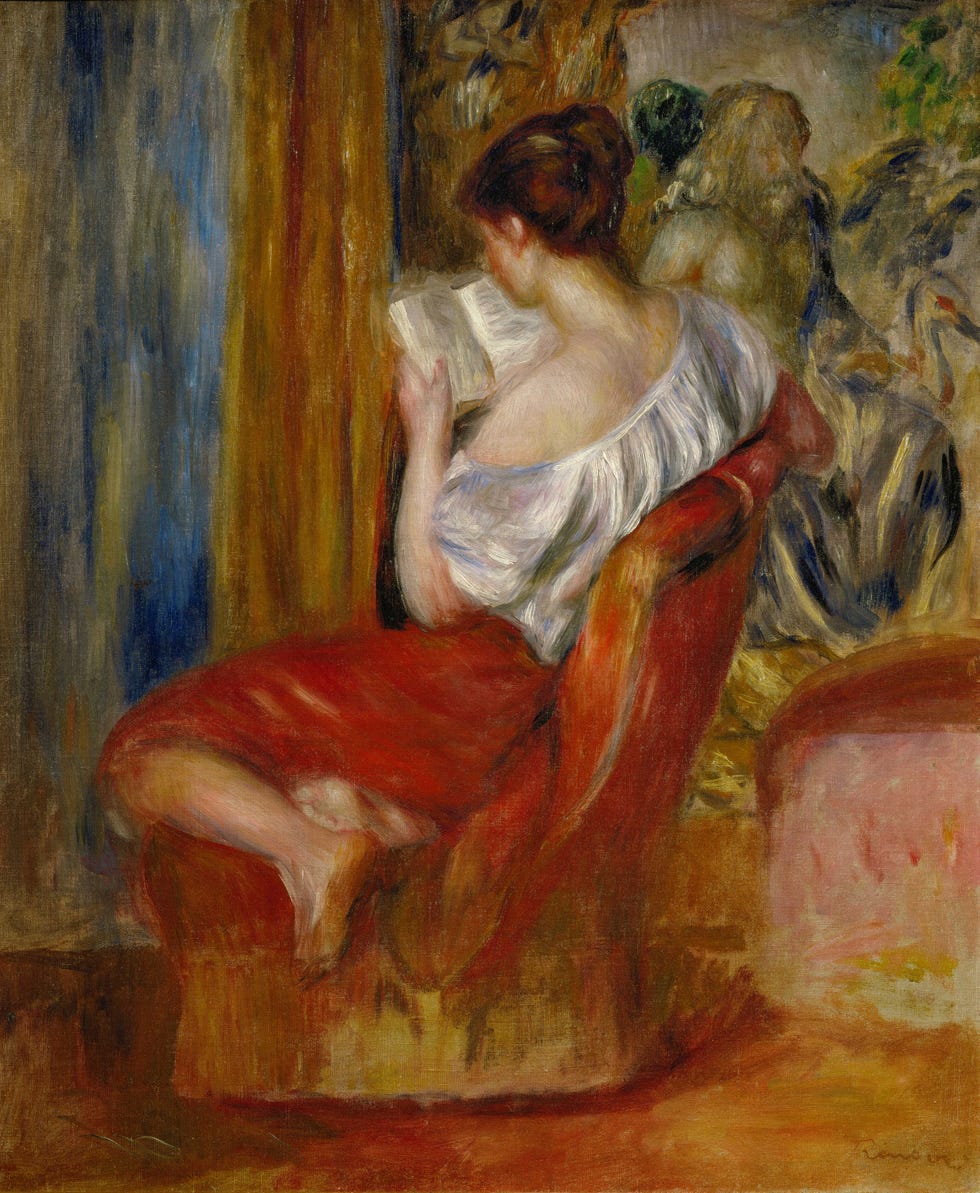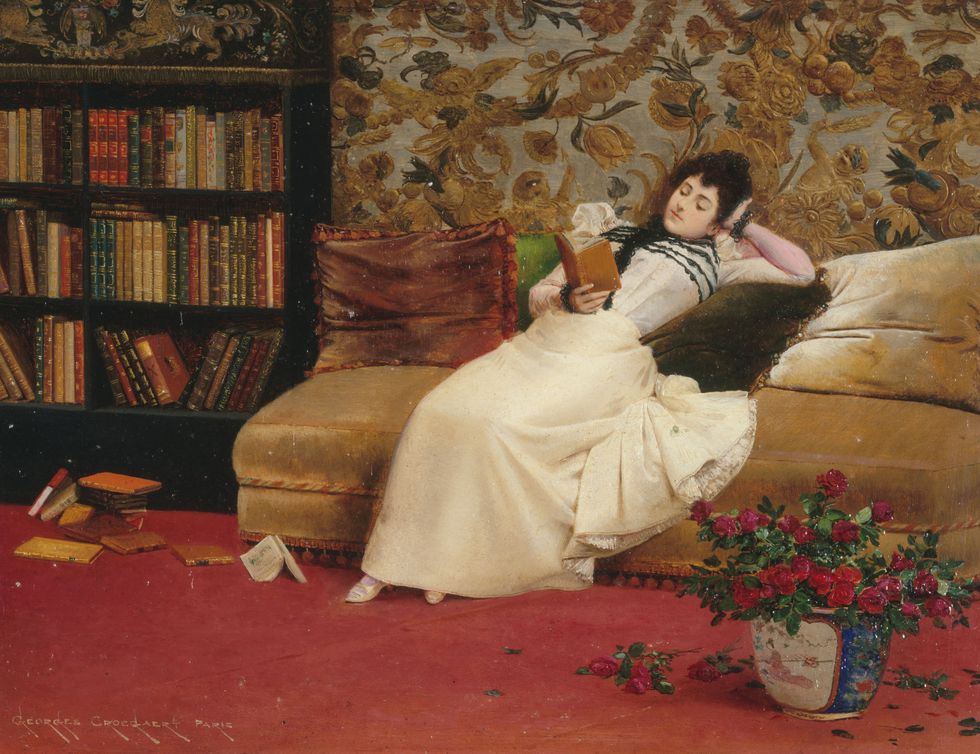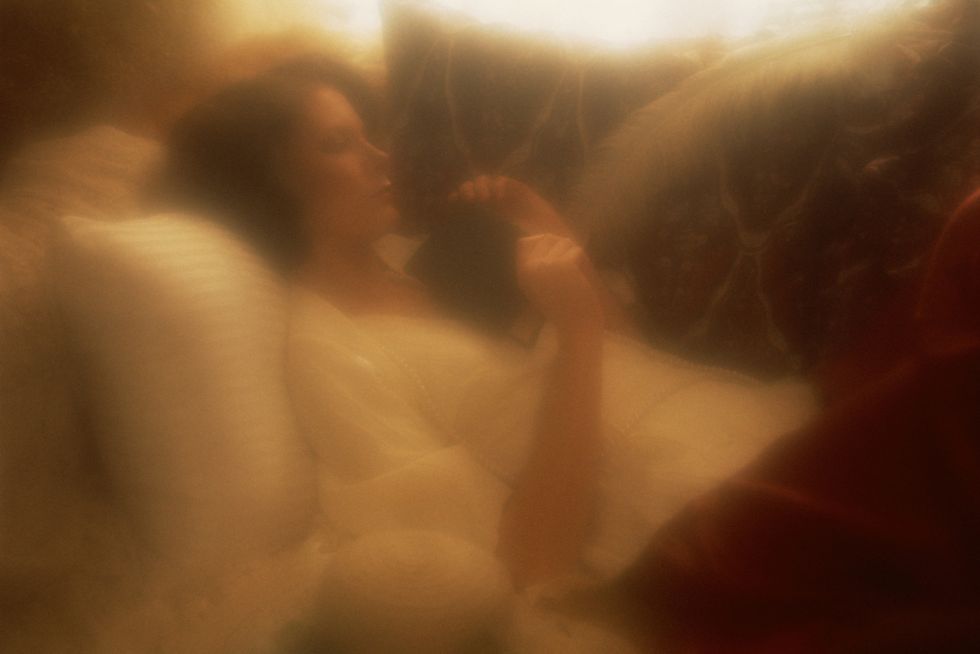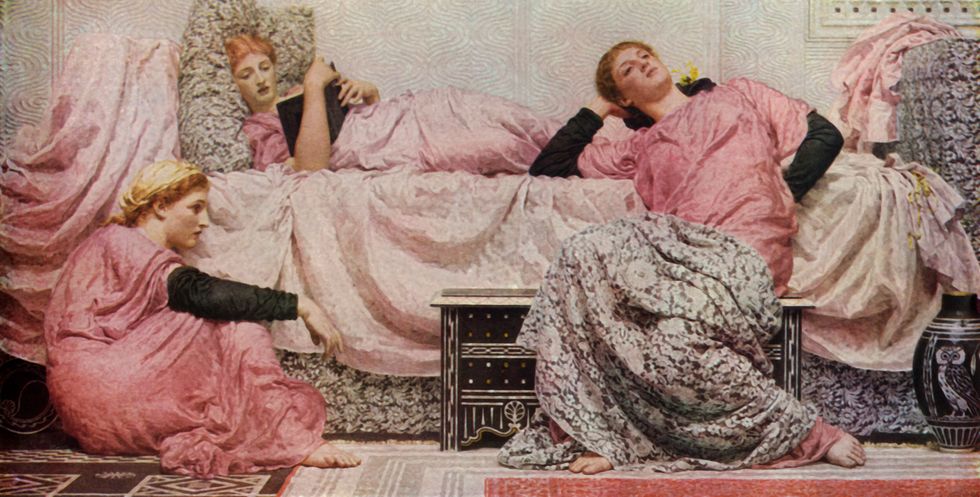A girl in her twenties basks in an apartment in New York City and ruminates on heterosexual love, further intensifying her sense of ennui. She is flooded by one of the following dilemmas: a) existentialism, b) declining mental health mixed with crippling emotional distress, c) alcohol and drug usage, or d) all of the above. She feels her youth and her beauty slowly slipping away, misspent on the pursuit of pleasure or independence.
These are just some of the identifying features of “no plot, just vibes” novels, a genre that’s being celebrated across BookTok, the affectionately nicknamed community of book lovers on TikTok. Over the last few years, BookTok has blossomed as a community for sharing short-form reviews, book recommendations, discoveries, and relatedly, literary categorizations. Per BookTok, the cornerstone of the “no plot, just vibes” canon is Ottessa Moshfegh’s My Year of Rest and Relaxation, which documents a woman literally lying around for most of the novel, self-sedating with a potent cocktail of pharmaceuticals. Sally Rooney’s Normal People and Conversations With Friends are also often cited, along with Rachel Cusk’s Outline trilogy, Halle Butler’s The New Me, and Elif Batuman’s The Idiot. BookTok users have also reclassified timeless works like Mrs. Dalloway, The Bell Jar, and Franny and Zooey as light on plot but heavy on vibes.
“Don’t be mistaken; there is a plot,” one commentator clarified on a “no plot, just vibes” BookTok roundup. “It’s just inside the characters.” What the novels often lack in a plot-driven narrative, they make up for in insightful conversations between characters or their internal monologues. Most strikingly, a common thread running through the genre is women authors creating female characters who are often difficult and complex. “I love a detailed character, especially one written by a woman,” one “no plot, just vibes” fan wrote on BookTok.
Marlowe Granados, a Toronto-based novelist and filmmaker, says her 2020 debut novel, Happy Hour, was tagged as “no plot, just vibes.” Happy Hour follows two young, broke women who move to Manhattan, chronicling their friendship’s ups and downs through erratic adventures. “When people say nothing really happens in the novel, I find it funny because something happens every night with the girls,” she says. Isa and Gala, her two main characters, freely galavant around the city, spinning youthful memories out of East Village dive bars. “When you put it all together, there’s not this traditional structure of rising and falling action, because I’m not interested in that. All the books I love aren’t traditional in that way, and I’m open to exploring non-linear expressions and narratives.”
Granados remembers learning about fictional plot structure in grade school, with a teacher drawing a predictable diagram: a pyramid shape that maps out the desired flow of events in a storyline. “It was never my taste,” she says. “For me, plot is just an accumulation of moments, and it doesn’t necessarily have to be so rigid in structure or formulaic. That doesn’t reflect how people live their lives.”
“My approach with Happy Hour was to find a strong, feminine, and stylized voice. I had to ponder how that would look and sound. My experiment was to create prose that opposed the sparse and monotone voice we often see in contemporary literature. I wasn’t attempting to have this conventional series of events.”
When she first went out to publishers with the novel, Granados shared that no one wanted it, and she was left to infer that editors expected something terrible or catastrophic to happen to the women as retribution for their laissez-faire lifestyle. “People need to have a wider palette of what they can consume, and publishers need to be willing to explore new structures. If a piece challenges male-centric literary frameworks, that shouldn’t erase the legitimacy of the art.”
Likewise, novelist Coco Mellors published her debut novel, Cleopatra and Frankenstein, in 2022, an unconventional prose that illustrates a young woman and an older man manically in love. Mellors’ novel is widely admired among BookTokers, regularly recommended for those craving “no plot, just vibes” and coming-of-age theatrics. “In the context of ‘no plot just vibes,’ people are comparing plot to a traditional, commercial vessel, and I never saw plot through this lens,” she says.
Mellors’ own recipe for plot formulation in literary fiction is: characters x time = change. She explains that the mechanism offers a valuable structure for visualizing the engine of a novel. “If characters are stagnating or not changing, it ultimately won’t make for exciting or dramatic storytelling. But watching a character change substantially, regardless of whether or not that evolves from the tropes of traditional plot elements, like betrayal or murder, is still a compelling plot.”
To avoid any negativity, Mellors refuses to read reviews, fearing she’ll internalize the comments, and they’ll hinder her writing process. “Back when I read reviews, I saw numerous critiques mentioning that Cleopatra and Frankenstein isn’t for everyone, and I find that to be a pointless comment, because what book is universally for everyone?” she says. “The book finds the reader it is right for, and that’s an incredible gift. If I enjoyed writing it, someone out there would enjoy reading it, and that’s the right reader for the book.”
Kylie Whitehead, the novelist behind Absorbed, a story that explores the nature of female insecurity and the all-consuming turns of modern relationships, shares a similar perspective. To Whitehead, the “no plot, just vibes” label is simply “a way of describing quieter, more introspective narratives as opposed to action-packed, twisty thrillers.” She continues, “Some stories are plot-driven with red herrings, action, and suspense, whereas others use the plot as a vehicle to tell the story through elaborative characters or jarring perspective.”
Notably, in “no plot, just vibes” storylines, authors are often depicting archetypes of womanhood—self-loathing, romantic turmoil, and the pressure of expectations—which has only further uplifted the genre’s popularity. “I think BookTok has enabled a community of young women to share narratives that resonate with them,” Whitehead says. “Young women who enjoy ‘no plot, just vibes’ novels feel recognized, which is a wonderful experience to share with others.”
To Mona Awad, the Canadian novelist behind Bunny and Rouge, it’s a genre more than worth paying attention to. (She names Jean Rhys as her favorite “no plot, just vibes” writer.) “It’s very attractive to me,” Awad says. “I love a vibe, and that’s why I became a storyteller. The beauty of a story is not necessarily the movements of a plot; it’s being immersed in another world, another person’s experience or consciousness and seeing the world through their eyes. The atmospheric details of an imagined world is an addictive drug, and ‘the vibe’ is truly what I stay for.”
She also clarifies that books often labeled with “no plot” are built with plot; it just might not be as apparent. “More intuitive and intimate plots excite me, specifically ones that are not overt and obvious,” she says. “They tend to have dynamic and dimensional narrators who hold a believable voice. This distinctive narration transports you into their world, and you truly believe in the fictional reality, because the voice is that strong.”
When starting her novels, Awad begins with developing the characters and understanding their surroundings before building the storyline. She experiments with music, films, and scents to construct that curated universe. “Overarching events don’t always need to occur. Simply existing with the characters and exploring their world is enough to fulfill and satisfy me.”
For readers, not receiving the gratification of a traditional plot has proven to be a blessing in disguise, exposing them to vibrant narration and nuanced forms of literary structures. Books that follow a traditional high-and-low story format can be predictable, and if all literary fiction mimicked this, nothing would be new or captivating. In the creative jungle of “no plot, just vibes,” on the other hand, anything is possible. As one BookToker put it: “Sometimes all you need is a story with great personalities.”

Freelance Writer
Caelan McMichael is a freelance writer based in Toronto covering fashion, art and culture. She has contributed to 032c, Cultured, Elle, Nylon and S/Magazine.




